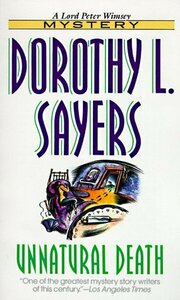Take a photo of a barcode or cover
Probably my 4th favourite Wimsey book (Gaudy Night, Murder Must Advertise and the Nine Tailors being the first three).
I usually really enjoy the Peter Wimsey mysteries but this one was a bit slow even though it was short. Miss Climpson seemed liked she was supposed to be intelligent but came across quite poorly. There are also several racist comments and situations that are presented as being quite normal and acceptable and that were hard to read. This was especially hard coming from characters whom I otherwise like. I know it was written in the 1920s but that doesn't make it okay.
I can't decide whether this or the previous book in the series, Clouds of Witness, is the better one. To a large degree, they're aiming for different things. Unnatural Death is, by far, the more urgent and oppressive of the two, and it turns a broader spotlight on the psychology of the characters - heroes and villains alike - than the previous installments. That gave me a real rush to finish it, and upon finishing, to immediately tell all my friends, "I have read a sensational book!"
In the harsh light of day, I think it's necessary to examine the different sides of it a little more closely. I do think that this, the third Lord Peter Wimsey novel, is the first one that feels like a genuine and whole novel, plotted out start to finish. Whose Body? was a bit pedestrian, but punctuated by a couple of great set-pieces, and Clouds of Witness constructs a better plot only to end on an anti-climax. Unnatural Death doesn't do that, although - like Whose Body? it should become obvious to most readers who the killer is roughly halfway through the book. In both cases, Sayers switches tack from a more straightforward mystery to something closely resembling a (talky) thriller, and I think here, she pretty much gets away with both halves.
Much has been made of the casual racism in the book (which is certainly there) as will as the anti-homosexuality aspect. I think both of them are very complex, and while they certainly don't stand up to modern sensibilities, how much they impact enjoyment of the novel is going to strike each reader differently. I think it's pretty obvious that Sayers was trying to criticize racist thought and behavior, despite using language of the time and not thinking out (or being allowed to spell out - your choice) the ramifications of her protagonists' own bias. That's less obvious with the LGBT characters, although still possible. For my own part, I disagree with author Minette Walters (who wrote the introduction to my copy) and her observation that Miss Climpson's views on homosexuality may parrot Sayers' own. Personally, I catch the whiff of satire here, as I do in some of Lord Peter's actions that lead to terrible consequences; I'm not sure any of her characters speak directly for Sayers. However, I will say that she has made them distinct enough, and her own voice neutral enough, that we will always be left to wonder. If it's satire, she certainly never "brings it home" in the way you might expect - and again, you can ask yourself if that was her intention, or her editors'.
One thing that impresses me, though, is that Sayers is doing a lot of work to add complexity to her characters, and to suggest that neither are all people the same, nor what they always seem to be. Wimsey has already changed significantly from the total fop in Whose Body?, and I think, all for the better; he's less irritating now, and the foppery comes and goes. Parker has biases which are not shared by Wimsey, but he observes unthinking behavior from Wimsey he knows comes with his class. Even the LGBT element seems to fall in with this intention: we are presented with one female couple who is totally loving, and dedicated to another in a healthy way, and another which is very much not. It's easy to dismiss that as "evil lesbians," but I think Sayers is trying to say, in her restricted way, that people are more than their stereotypes. That's a complex idea somewhat simplistically presented, but it's already far beyond what Agatha Christie was writing around this time (or, if I'm honest, ever), and Margery Allingham was just starting to dip her toe into the same water.
I don't know that Unnatural Death is a great book, but it's a good book, and it demonstrates a certain progression in Sayers' writing that leaves me eager to move on to the next in the series.
In the harsh light of day, I think it's necessary to examine the different sides of it a little more closely. I do think that this, the third Lord Peter Wimsey novel, is the first one that feels like a genuine and whole novel, plotted out start to finish. Whose Body? was a bit pedestrian, but punctuated by a couple of great set-pieces, and Clouds of Witness constructs a better plot only to end on an anti-climax. Unnatural Death doesn't do that, although - like Whose Body? it should become obvious to most readers who the killer is roughly halfway through the book. In both cases, Sayers switches tack from a more straightforward mystery to something closely resembling a (talky) thriller, and I think here, she pretty much gets away with both halves.
Much has been made of the casual racism in the book (which is certainly there) as will as the anti-homosexuality aspect. I think both of them are very complex, and while they certainly don't stand up to modern sensibilities, how much they impact enjoyment of the novel is going to strike each reader differently. I think it's pretty obvious that Sayers was trying to criticize racist thought and behavior, despite using language of the time and not thinking out (or being allowed to spell out - your choice) the ramifications of her protagonists' own bias. That's less obvious with the LGBT characters, although still possible. For my own part, I disagree with author Minette Walters (who wrote the introduction to my copy) and her observation that Miss Climpson's views on homosexuality may parrot Sayers' own. Personally, I catch the whiff of satire here, as I do in some of Lord Peter's actions that lead to terrible consequences; I'm not sure any of her characters speak directly for Sayers. However, I will say that she has made them distinct enough, and her own voice neutral enough, that we will always be left to wonder. If it's satire, she certainly never "brings it home" in the way you might expect - and again, you can ask yourself if that was her intention, or her editors'.
One thing that impresses me, though, is that Sayers is doing a lot of work to add complexity to her characters, and to suggest that neither are all people the same, nor what they always seem to be. Wimsey has already changed significantly from the total fop in Whose Body?, and I think, all for the better; he's less irritating now, and the foppery comes and goes. Parker has biases which are not shared by Wimsey, but he observes unthinking behavior from Wimsey he knows comes with his class. Even the LGBT element seems to fall in with this intention: we are presented with one female couple who is totally loving, and dedicated to another in a healthy way, and another which is very much not. It's easy to dismiss that as "evil lesbians," but I think Sayers is trying to say, in her restricted way, that people are more than their stereotypes. That's a complex idea somewhat simplistically presented, but it's already far beyond what Agatha Christie was writing around this time (or, if I'm honest, ever), and Margery Allingham was just starting to dip her toe into the same water.
I don't know that Unnatural Death is a great book, but it's a good book, and it demonstrates a certain progression in Sayers' writing that leaves me eager to move on to the next in the series.
Audiobook: 7h.47m.
There is something a degree more Troubling about this Sayers mystery, the first two stories in the series were quite lighthearted for books about nursery, but a large portion of this one sits on the heavier side, and less focused on the Lord Peter’s naturally cavalier nature. Though they do share moments of humour, both Peter and Parker have their “serious hats” on this time. Though tonally shifted, the story is still compelling and well constructed. I do hope these young men can recover the joie de vivre before the take on their next case; it suits them both better than cynicism.
There is something a degree more Troubling about this Sayers mystery, the first two stories in the series were quite lighthearted for books about nursery, but a large portion of this one sits on the heavier side, and less focused on the Lord Peter’s naturally cavalier nature. Though they do share moments of humour, both Peter and Parker have their “serious hats” on this time. Though tonally shifted, the story is still compelling and well constructed. I do hope these young men can recover the joie de vivre before the take on their next case; it suits them both better than cynicism.
Short Review: This is the third book in the Peter Wimsey series (but the fifth I have read since I have been reading them out of order.) Wimsey overhears a doctor talking about the death of a patient and decides that the patient was killed, and might have been a perfect crime. So most of the book is trying to figure out who would have killed an elderly woman that was already just a couple months from dying. Once the likely suspect was identified the rest of the book tries to figure out how.
This is a good book, but not as good as the first and sixth books of the series. But better than the fourth book (a short story collection.)
My full review is on my blog at http://bookwi.se/unnatural-death/
This is a good book, but not as good as the first and sixth books of the series. But better than the fourth book (a short story collection.)
My full review is on my blog at http://bookwi.se/unnatural-death/
Loved it. My Literature teacher gave the book to me and I really enjoyed it.
There are some good reviews out there already so recommend you check them out.
In terms of the "mystery" aspect of the book, it was reasonably satisfying. I also quite enjoyed the way this tackled some of the issues around Lord Peter using sleuthing as a hobby and the impact it can have on others (although it very much felt like just scratching the surface). But there are so many aspects of this book that made me uncomfortable - race and class predominantly. I would have felt a lot more secure if I had a clearer view of the author's perspective and how much it was about her drawing her characters.
In terms of the "mystery" aspect of the book, it was reasonably satisfying. I also quite enjoyed the way this tackled some of the issues around Lord Peter using sleuthing as a hobby and the impact it can have on others (although it very much felt like just scratching the surface). But there are so many aspects of this book that made me uncomfortable - race and class predominantly. I would have felt a lot more secure if I had a clearer view of the author's perspective and how much it was about her drawing her characters.
dark
mysterious
sad
slow-paced
Plot or Character Driven:
Plot
Strong character development:
No
Loveable characters:
Complicated
Diverse cast of characters:
No
Flaws of characters a main focus:
No
Graphic: Racial slurs
Moderate: Homophobia, Misogyny, Racism





